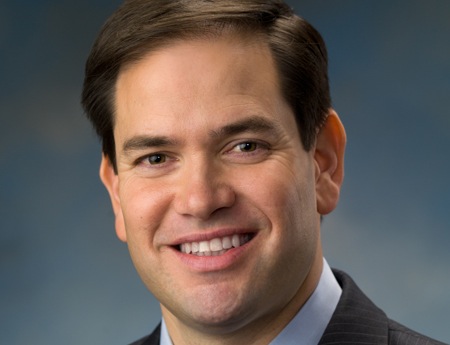Cable-Friendly Rubio Starts His Run

The smarter way to stay on top of broadcasting and cable industry. Sign up below
You are now subscribed
Your newsletter sign-up was successful
Sen. Marco Rubio (R-Fla.) wants to be president. What he doesn’t want is for the FCC to regulate the Internet under Title II. That’s just one of many things distinguishing him from the current occupant of the White House.
Rubio is the latest member of the Senate Commerce Committee—which oversees communications policy—to seek, or consider seeking, the highest office in the land.
Sen. Ted Cruz (R-Texas) beat him to the punch, while committee chairman Sen. John Thune (R-S.D.) comes up in conversations about potential candidates. No Senate commerce chairman has ever made it to the Oval Office, though not for lack of trying by three-time chairman and longtime candidate John McCain.
Rubio, a mediagenic young senator of Cuban-American heritage, could help the Republicans improve their numbers in the Hispanic community, and if he does not prove to be the presidential choice for 2016, 2020 will already be looming before the country starts hailing the new chief.
Rubio’s climb up the political ladder has followed a seasoned route. He was tapped in 2013 to provide the response to the president’s State of the Union speech, a responsibility reserved for party fixtures or up-and-comers—Louisiana Gov. Bobby Jindal in 2009, Rep. Paul Ryan (R-Wis.) in 2011.
OK…Rubio had a viral water-break moment that night, and he is only now emerging from the middle of the pack in popularity polls. But just two weeks ago, the political handicapping site FiveThirtyEight declared that the official Republican field had gotten its first real contender in Rubio, calling him an electable conservative, which can be translated to mean not nearly as extreme as Ted Cruz, according to the site.
In terms of the industry, a President Rubio would almost certainly support a Congressional effort to undo Title II. Following the FCC’s Feb. 26 decision to reclassify ISPs under common carrier regs, Rubio was on the same page as cable operators when it came to the perceived impact of the decision.
The smarter way to stay on top of broadcasting and cable industry. Sign up below
“The Internet is not a place where we need to start posting new speed limits and setting up new speed traps, but that’s essentially what this federal action threatens to do to the Internet,” he said. To which he added, “A federal government board in Washington today took action that threatens to overregulate the Internet to the point of making it more expensive for consumers, less innovative and less competitive.”
The senator has also pushed for opening up more of the WiFi spectrum that cable operators need to provide wireless broadband mobility to their wired customers.
Rubio teamed with Sen. Corey Booker (D-N.J.) earlier this year to light a fi re under an FCC effort to free up spectrum in the upper 5 GHz band for unlicensed WiFi use. That legislation drew plaudits from the cable industry. The National Cable & Telecommunications Association called it “a clear path forward for properly allocating a finite and increasingly necessary public resource.”
Rubio is also on the same page as cable operators when it comes to the FCC’s preemption of state laws limiting municipal broadband. After Wheeler signaled he thought it was within the FCC’s power and an appropriate response to laws he said were pushed by incumbents trying to fend off competition, Rubio was among a group of Republican lawmakers to fi re off a letter to the chairman warning him against usurping state laws. Fellow candidate Cruz had his signature on that letter as well.
LOW-POWER PLAY
The LPTV Spectrum Rights Coalition is calling on the federal government to give purchasers of low-power TV spectrum a tax credit to help LPTV and translator station owners unlock the value of their investments before the incentive auction.
Those stations do not get to surrender their spectrum to the FCC for compensation, as full-powers and class A low-powers get to do, but the plan would allow a middleman investor to compensate the service and translator owners and, in turn, get a tax credit for relinquishing that spectrum to the government.
Without such a spectrum clearing tax credit plan to help LPTVs, the coalition says, it will likely fi le suits against the auction that could delay the process and the FCC’s planned early-2016 time frame for conducting it.
The coalition says the tax credit needs to be made available for calendar year 2016 to “eliminate the likelihood of legal actions against the incentive auction in the fall of 2015.”
Like the incentive auction itself, the coalition proposes the credit be a voluntary program.
“This tax credit would only work if supported now, before the final LPTV rulemaking by the FCC, and while there is still time to get it considered and enacted with the 2017 budget. This will literally be the last chance to avert actions no one wants to take, especially LPTV licensees,” the coalition said.
Contributing editor John Eggerton has been an editor and/or writer on media regulation, legislation and policy for over four decades, including covering the FCC, FTC, Congress, the major media trade associations, and the federal courts. In addition to Multichannel News and Broadcasting + Cable, his work has appeared in Radio World, TV Technology, TV Fax, This Week in Consumer Electronics, Variety and the Encyclopedia Britannica.

